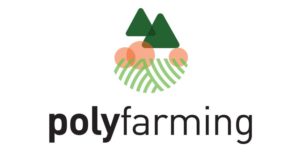 Life Polyfarming is a regenerative agriculture project that combines forest resources, livestock and crops to recover a fertile soil in Mediterranean mountain areas. The project, co-financed by the European Commission’s LIFE program, is led by the CREAF and the Planeses farm, where it is carried out on a real scale.
Life Polyfarming is a regenerative agriculture project that combines forest resources, livestock and crops to recover a fertile soil in Mediterranean mountain areas. The project, co-financed by the European Commission’s LIFE program, is led by the CREAF and the Planeses farm, where it is carried out on a real scale.
For the LIFE Polyfarming project, the forest is an essential resource for all farm activities: tree trunks and branches are used to produce biochar, rameal chipped wood and crops on a bed of trunks. These techniques, in addition to improving soil fertility, are a great opportunity to mitigate the climate change, both to sequester the large amount of atmospheric carbon that trees contain, and to better use water in a drought situation, which will become increasingly frequent.
According to this innovative system, livestock is also a key piece to enrich the soil and restore its fertility. At Planeses, they manage the livestock through the “Programmed intensive herding”. In addition, Polyfarming proposes a self-management of mountain orchards without plowing, so the soil structure is not broken.
 Polyfarming system is an alternative to the current agriculture and livestock system. This change of model claims food sovereignty, helps to mitigate climate change and recovers agro-silvo-pastoral activity in Mediterranean mountain areas. You can keep informed about all our news by subscribing to their newsletter!
Polyfarming system is an alternative to the current agriculture and livestock system. This change of model claims food sovereignty, helps to mitigate climate change and recovers agro-silvo-pastoral activity in Mediterranean mountain areas. You can keep informed about all our news by subscribing to their newsletter!
CREAF, coordinator of the project, is a public center of research in terrestrial ecology and territorial analysis that generates knowledge and methodologies for the conservation, management and adaptation of the natural environment to global change. CREAF is also a member of Euromontana, learn more on the organisation by reading our interview of Bernat Claramunt López, researcher at CREAF.
Silvopastoral activities in mountain areas can bring additional value to mountain farming. It indeed helps preserving landscapes and prevents from forest fires for instance. More broadly, pastoralism – and the different methods to sustainably manage mountain grasslands – are critical for the environmental, social and economic sustainability of mountain areas. A report showcasing a wide range of good practices for the sustainability of mountain pastures and formulating different policy recommendations will by published by the LIFE Oreka Mendian project later in 2020.
5 November 2019









